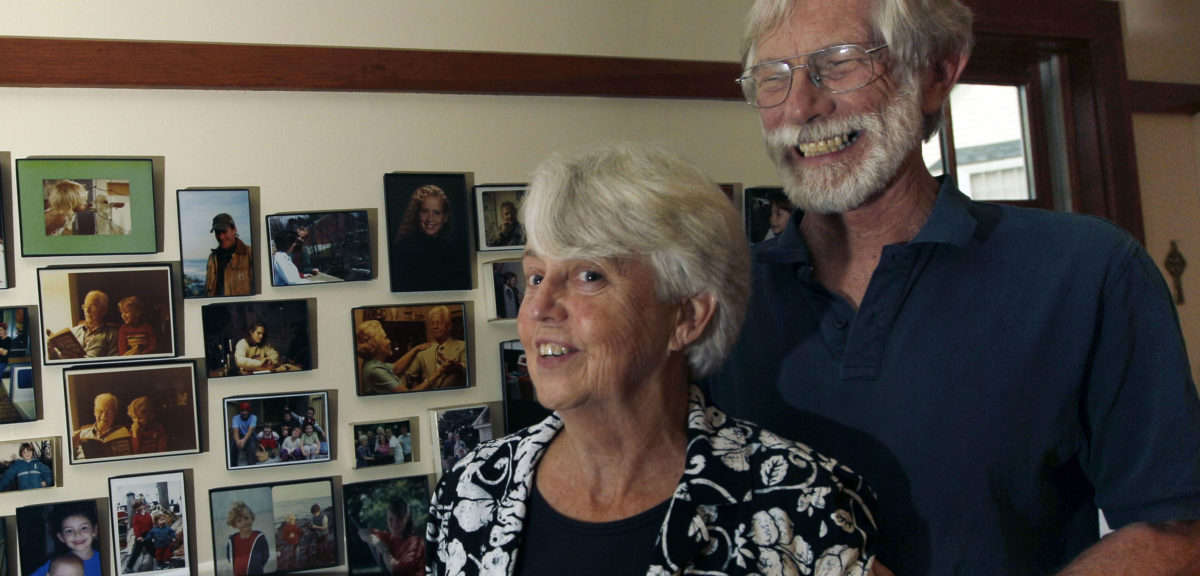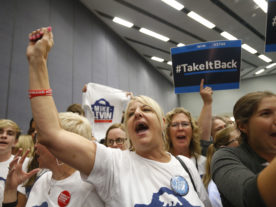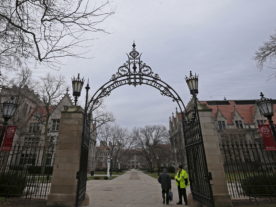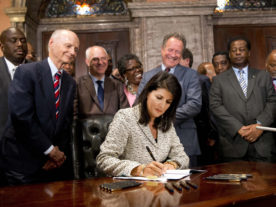Each workday, Marty Harwell, 66, sets the alarm for 5:15 p.m., giving himself enough time to grab a shower and something to eat before clocking in for his 7 p.m. night shift as a pediatric nurse working in home health care.
The California man, who worked in the music industry for most of his adult life, fell back on nursing full time in order to guarantee a steady income for himself and his family.
“I’ve had a couple of questions like, ‘When are you going to retire?’ somewhat facetiously from people who want my slot, who are younger,” Harwell says, “but otherwise I have not encountered any kind of age discrimination or pay loss.”
Harwell is among the almost 1 in 5 Americans aged 65 and older who are still working or looking for work, according to the AARP, a nonprofit organization that advocates for older Americans.
But while two-thirds of senior citizens say they plan to work well into their retirement years like Harwell is doing, only about 20 percent actually do.

Photo by Flickr user Chapendra via Creative Commons license.
There are a number of reasons for this under-employment, according to Teresa Ghilarducci, a labor economist who specializes in retirement security.
“They have to find the best job under limited circumstances,” Ghilarducci says. “They’re usually stuck in place because they own a house or they have a lot of embedded family relations. So the one challenge is that they can’t move like young people can to find a good job.”
The second challenge is age discrimination.
“Especially against women and not just in terms of being hired, but also promotion, training and pay increases,” she says. “Ageism seems to affect women more than men. Meaning that perceptions of older women in terms of their ability to learn, their ability to get along with other people at work, are viewed as more negative than it is for an older man.”
Another roadblock is that certain jobs require more physical ability than some older people have. Also, they might not be as up to speed on computers as younger workers. And even if senior citizens are able to catch up, many employers might be reluctant to offer training to older workers due to concerns it won’t pay off because the older worker might not stay on the job as long as a younger co-worker.

For some of those older Americans who are employed, the job is often more lucrative than ever. The U.S. Census Bureau reports that workers over 65 are not only making more money on average than ever before, but they’re also outpacing the average earnings growth of other age groups.
But Ghilarducci cautions that those rosy numbers can be misleading.
“We find there’s a lot more inequality among the older age groups,” she says. “So there are some very highly paid people who are older who are getting big wage increases, but the average is being pulled up by just a few.”
By 2030, one in every five residents will be older than age 65, according to the U.S. Census Bureau.
More age-friendly employers in the not-for-profit sector, such as hospitals and government agencies, are preparing for the time when there are many more older people in the workforce. Workers 55 and older already make up one-third of home health and personal care aides.
However, Ghilarducci finds that far fewer for-profit companies are creating workplaces that will attract older people.
As for Marty Harwell, he has no plans to retire. Most of his friends still work, at least part time, and he expects to do the same.
“About three years ago I realized I wanted to come full circle back to my musical profession and then from there I realized, ‘Well, I don’t really want to retire per se,’” he says. “I am going to shift gears and do what makes me genuinely happy.”
Harwell views working in music as a “joyful task” and expects returning to his passion will earn him enough money to keep him happy and satisfied during his so-called “Golden Years.”























Most of us don’t want to deal with age discrimination. If I apply for a good job I am more qualified than 10 others who apply for the same position, but if I’m told I can try to address the issue, I actually “grow on you” very quickly and my potential shines. Nobody sees beyond the age and won’t give us the chance!
I see so many retirees serving as volunteer workers in towns, libraries, hospitals, art galleries, historical preservation societies, garden clubs, schools… They are everywhere do many good things for society without getting paid. A great hidden workforce across US that benefits us all.
It is said that age is just a number. One must keep himself or herself occupied with those small little things that keep them happy. If you are good at singing, keep singing, even if you are at home. If writing is a passion, put down your thoughts, observations, and suggestions on a blog. You can be a guest writer as well. There are so many things one can do from home. With the internet coming in handy, you can keep yourself busy by working from home. Online marketing/classes etc have become popular. You too can. The whole idea is to keep yourself mentally and physically agile. Let there be nothing like retirement in your life. Live full, be happy and enjoy!
It is hard to keep looking for work. It is painful when you have a great rapport with someone though email and text, then you see their face fall when they meet you and suddenly the job disapears, not ready to hire, really looking for someone with a different skill set (when you were perfect after emailing your resume), etc. When job after job the person hired was less qualified but younger. I no longer shop or do business if they don’t have anyone my age working there. No money to the agists!